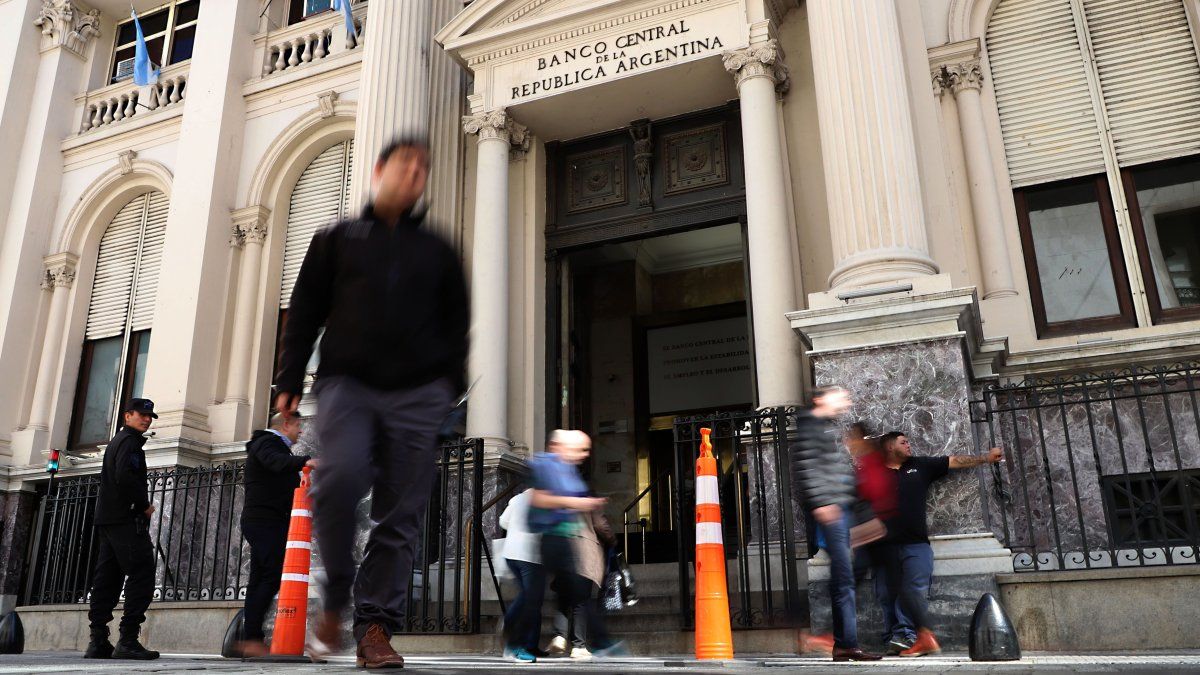Federico Tomasevich: There is a global phenomenon of deglobalization that is seen, especially in the insurance business, retail banks, investment banks and fund managers. Global banks are not created that cover the world as in the 90s, when a proliferation of this type of entities was seen. There is no bank that advertises and takes being a global bank as an “asset” because there are none left. The large global banks gradually concentrated each on their region.
That means that, today, all over the world, entrepreneurs and local entities are the most important. You go to Mexico and the most important banks are Mexican. In Brazil, that is repeated, they are Brazilians. You go to Chile and the largest banks are Chilean. And you come to Argentina and it is no exception, that same trend occurs, just like, for example, in Paraguay. All countries have more and more concentration and, on the other hand, niche entities are growing: banks that are experts in consumption, others, in foreign trade or in financing capital goods. In that sense, Argentina has a concentration ahead of it. Because it has many players in the industry.
Q: So, you don’t see it related to a local phenomenon, to a change in the business climate.
FT: This responds to a 100% global trend and closely related to a major deglobalization product of geopolitical tensions. Nor is it a phenomenon in Argentina that multinationals that have already decided that they want to concentrate on their businesses leave. Generally, that company announced in Germany that it was going to concentrate on Europe and, then, Brazil, Argentina, Chile, etc. begin to emerge. And the banking business, fund managers, insurance companies and investment banks are no exception. We see it here now because we had a greater atomization than the Latin American average.
P.: Yes, it is true that the local market, due to the conditions it offered, is very fragmented.
FT: Very. If we take the number of banks in the financial system and compare it with those in Latin America, in each of the relevant countries, Argentina has many more. And, not to mention the market for brokerage houses and insurance companies. So, It should be logical that there is economy of scale and that there is concentration. In fact, when we look at the “top ten”, those who manage 75% of the assets, volume and flows are always, in all countries, the first three. In insurance, in investment banks, in commercial banks, there is a large concentration of the business.
Maybe, In Argentina, the fact of having a very disordered macroeconomy helped many in the industry to remain. There is also a mismatch with the issue of inflation, which impacted capital requirements, they were very mismatched and the funds that companies would need in a normalized macroeconomy should be different.
markets finance live stocks stocks investments
Crucial months for the economic management of Javier Milei.
Depositphotos
An expansion of the financial business
Q.: Now in Argentina, are new businesses opening up for banks and the financial sector in general? Where are the opportunities today and in the future?
FT: We come from a totally different macroeconomic context where the only thing that rose was the dollar. People bought the MEP dollar, which rose the most. And, consistently, in the last four years that was what had been happening. Now, More than new business, we see business growthbecause when the Gross Product is measured against loans, the indicator is one of the lowest in Latin America. So, With an orderly macroeconomy, the amount of loans should increase. The same applies when we measure Gross Product against assets under management in mutual funds and the same with market capitalization.
You have to think that, For five years, Argentine companies, large and medium-sized, have not accessed the international debt market. That means they are more solvent.. Then, they can issue debt. In fact, we see issuances of negotiable obligations like crazy. And the rates are going to be increasingly competitive because the country risk is decreasing. This trend should allow companies to invest in infrastructure and productive activities. It is also important for the provinces, because for six years they have not been able to access international markets to finance infrastructure projects, which change the reality of a province in terms of production and quality for the inhabitants.
markets finance live shares stock markets investments tokyo

The market closely follows the Government’s movements.
Depositphotos
What happens to the real economy
Q: How does that look in the real economy? When is it translated?
FT: To the extent When the variables normalize, we will begin to see the results in the real economy. Financial assets reflect expectations of what will happen in the real economy. In fact, this is what is happening in the region. Paraguay is investment grade. Uruguay has three pastures, it has amazing foreign direct investment, a context of macroeconomic legal security that has allowed international investors to go there for decades, the same as Chile. And, in Argentina, it is also beginning to happen.
Why is what happens in Argentina so silent? Because perhaps there is other news that covers this type of news. But, in mining, in gas and oil, we see that there is growth and millions of dollars were invested this year in expanding evacuation capacities of the entire agribusiness industry. In fact, we saw a very large acquisition of a very large local group that bought a multinational that had plans to exit the region.
Q: And what role does deregulation play in this entire process? Do you see any limitations so that it does not destroy the local industry?
FT: It is a silent but very important job. That every day procedures for companies and citizens are simpler and do not hinder daily operations, simplify and lower costs, is key. Surely it is not possible to make a hundred deregulations simultaneously, but this fact that every week there is a small change, in the sum, is a big change.
There is not a single important change in Argentina, there are many at the same time. In this scenario, we have to sequence what we can do and try to operate them to the extent that the situation allows. And, today, What we see is the achievement of many things that are executed and generate positive externalities: country risk decreases, credit increases, interest rates and inflation decrease. On the other hand, it is true that spending falls, but that is a planned consequence, not one that anyone imagined.
Q: It is also a tool to control inflation.
FT: Clear. And it is very important that we are going to stop importing energy and that we are going to have an energy surplus in the short term. I think that, Beyond styles, the Government has been generating situations that cause certain things to begin to happen.. And, to the extent that the country risk decreases, we are going to have more companies that want to invest and more provinces that seek to develop relevant infrastructure, because, since there was no international market in the last six years, they could not finance it.
If everything remains the same and if the international context remains favorable, which is not a minor issue, this will be the case. Because The US rate is going down, then, despite the fact that the price of agricultural commodities is a little depressed, and that generates a flow of income to emerging markets.
dollar investments markets

The scope and doubts that can generate clouds in the path of the Government’s economic program.
Depositphotos
Country risk and the threat of a black swan
Q: What do you mean by the clarification of “if everything remains the same”?
FT: There are many international geopolitical tensions underway and it is difficult to gauge the consequences. So, I’m not talking about domestic issues in Argentina. It is very important that there is political stability for this to continue well, of course. But A favorable international context is also needed and there is no black swansuch as there not being an escalation of violence that no one had foreseen somewhere in the world or a major market correction. The international context is always important because we seek to leave behind a very high level of vulnerability, like the one we have.
Q.: The Government has to bring the country risk to more or less around 1,000 points to be able to return to the international credit market and it is a key issue for the entry of dollars.
FT: Today, The 1,100 or 1,200 country risk points do not reflect the reality of the Argentine economy. Because if not, we would not have those Argentine companies with debt issues at 7%. It has to be lower. It’s lower. You will tell me that the formula gives 1,100 country risk points, but that is because it is a technical issue. So I think it is very important that the course is maintained, that relative prices are normalized. They are all things that are sequential and cannot be all at the same time.
Q: It is true that there are very dynamic sectors, such as the financial sector, but how does this translate to other sectors of the economy, such as construction, which has negative data?
FT: The construction data could have been negative, but July and August were record months for real estate sales in Federal Capital. The stock for sale went down. On the other hand, the cost of construction increased and the price per square meter is sold more expensive. This leads to more construction and mortgage loans can stimulate demand.
The social leg, a key variable
Q: The problem I see there is the difficulty in accessing these credits.
FT: That is a task that the Government is already trying to address to make it possible for people to qualify. Governments in all countries of the world have to do it if they want an employee to be able to buy property, the market cannot solve it alone. And especially in countries that do not have pension funds, like ours. I think that The Government is working on this and will seek to imitate other models in the region. For this, the macroeconomy needs to be normalized.
Q: There has been a growth in social conflict recently. Do you think this is a worrying element for the development of the Government’s plan?
FT: To all economic and political actors They are concerned about the social variable, but not only in Argentina, but in all countries. To the extent that the macro stabilization program works and investment improves, the economy will begin to rotate at a different speed. The other alternative would be to broadcast, but we know that is not good. On the other hand, salary indicators show a positive recomposition and I believe that this helps to calm any tensions that may arise.
Source: Ambito
I am an author and journalist who has worked in the entertainment industry for over a decade. I currently work as a news editor at a major news website, and my focus is on covering the latest trends in entertainment. I also write occasional pieces for other outlets, and have authored two books about the entertainment industry.




